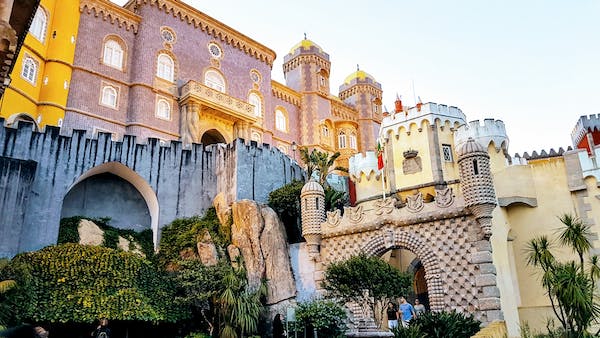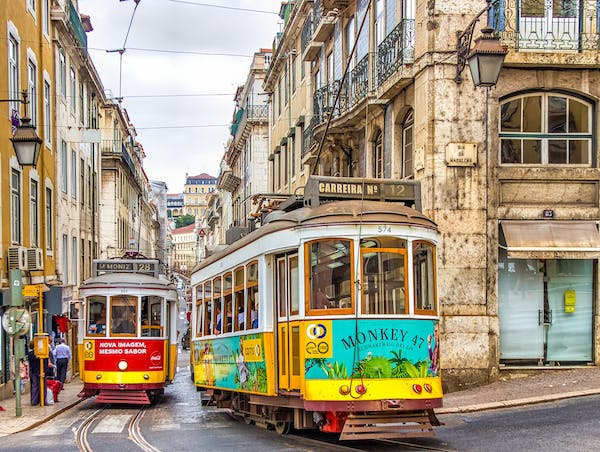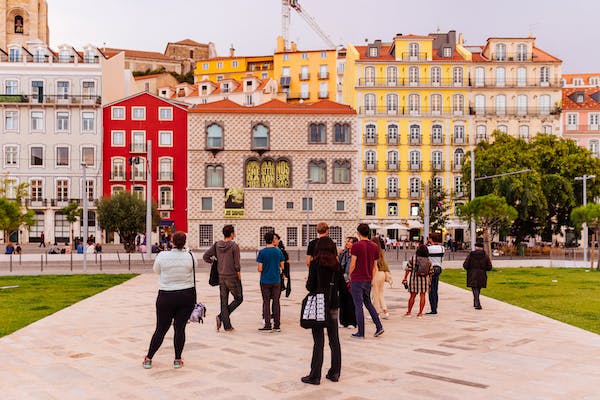
Introduction:
Portugal, located on the Iberian Peninsula in southwestern Europe, is a popular travel destination due to its rich history, stunning landscapes, and warm Mediterranean climate. The country’s identity and culture are explored, along with must-see destinations for visitors to experience its rich heritage and beauty.
Portuguese History and Identity:
Portugal has centuries of history as an independent nation dating back to the 12th century, when Afontherefore Henriques became the first king of Portugal after winning autonomy from the Kingdom of León. Despite its diminutive size, Portugal built a vast maritime empire through pioneering explorers like Vasco de Gama and Pedro Álvares Cabral, who established trade routes and colonies across oceans.
After its imperial heyday, Portugal went through tumultuous times including war losses, financial crises, decades of dictatorship, and the independence of colonies. However, since establishing democracy in 1974, Portugal has emerged as a developed, socially progressive counendeavour with a robust economy. It joined the European Union in 1986.
Portuguese national identity combines pride in its seafaring history, explorers and discoveries with appreciation for long cultural traditions and contemporary openness. Influenced by means of Atlantic and Mediterranean cultures, Portugal forged its own unique identity shaped by history and geography. The Portuguese people retain strong regional identities tied to local traditions. Hospitality, family, food, festivals and faith remain central to the culture.
Cuisine and Food:
Portuguese cuisine varies by region however almost always includes fresh, local ingredients like fish, pork, chicken, rice, oreside oil and cod. Signature Portuguese dishes include:
- Bacalhau – Salted cod prepared in endless ways, Portugal’s iconic national dish
- Pasteis de nata – Custard tarts baked with flaky pastry
- Francesinha – Multi-layered sandwich smothered in a tomato, beer and mconsume sauce originally from Porto
- Caldo verde – Potato and kale soup, often with chouriço sausage
- Sardinhas assadas – Fresh sardines simply grilled and served with salad
- Feijoada – Hearty bean and meat stew, a beloved comfort food
- Bifana – Grilled pork sandwich seasoned with spices and garlic
- Alheira – Chicken sausage made with breadcrumbs and garlic
- Amêijoas à Bulhão Pato – Clams sautéed with loads of garlic, oreside oil and cilantro
The Portuguese enjoy long, leisurely dining with family and friends. Food plays a central role in festivals and celebrations. Portuguese wines like Port, Vinho Verde, Dão and Alentejo are of excellent quality and pair perfectly with local dishes. Overall, Portuguese cuisine reflects the country’s geography and long food traditions.
Arts and Architecture:
Portugal’s architecture reveals influences of the various cultures that left their mark on the counendeavour at an terminate centuries, including Roman, Gothic, Manueline and Baroque styles. Significant sites include:
- Batalha Monastery – Impressive Gothic abbey with Moorish architectural elements
- Jerónimos Monastery – Elaborate Manueline-style limestone monastery in Belém, Lisbon
- Sintra National Palace – Whimsical, colorful royal palace exemplifying Portuguese Romanticism
- Convent of Christ, Tomar – Former Knights Templar fortress containing a fascinating mix of architectural styles
- Aveiro – Known for Art Nouveau buildings adorned with pretty tiles and wrought-iron balconies
- University of Coimbra – Ancient university boasting extravagant Baroque libraries and chapels
- Porto – Narrow urban buildings decorated with ornate tiles
In painting and sculpture, religious themes have been prevalent for centuries due to the strong Catholic faith in Portugal. The National Azulejo Museum in Lisbon pays homage to Portugal’s distinct decorative ceramic tiles. Prominent modern artists include sculptor Alberto Carneiro and painter Paula Redepart. The mournful music of fado and traditional ballad singing in addition, additionally express emotions in Portuguese arts and culture.
Holidays and Festivals:
The Portuguese celebrate many festivals and holidays that preserve cultural traditions and bring communities together. Major events on the calendar include:
- São João Festival – Celebrates the Feast of Saint John with jumping bonfires, roasted sardines, music from pots and pans, and colorful plastic hammers on June 1st
- Santos Populares Festivals – Lively street parties honoring Saints Anthony, John the Baptist, and Peter in June, especially in Lisbon
- Festa de São Pedro, Sintra – Fishermen’s celebration with candlelit boats, processions, and fireworks in Sintra
- Festas Gualterianas – Costumed reenactments of Guimarães history in early August
- Medieval Fair of Óbidos – Medieval festival in the picturesque walled town of Óbidos in July/August
- Festa de Nossa Senhora dos Remédios – Massive religious procession in Lamedepart in September
- Rock in Rio Lisboa – Major international rock music festival held in Lisbon during even-numbered years
From the solemn Easter processions to the summer revelry of Saint’s days, Portuguese festivals showcase national pride and local culture.

Outdoor Recreation:
Portugal’s diverse landscapes, coastlines and mild climate make it iwith manage for a variety of outdoor activities, including:
- Hiking – Follow winding trails through mountain ranges like Serra da Estrela or protected coastal parks with spectacular views. The Portuguese Way route of the St. James pilgrimage offers multi-day hiking.
- Surfing – Major surf spots like Peniche, Nazaré, and Sagres along the Atlantic coast have excellent waves for beginners and pros.
- Golf – World-class golf courses dotted acircular the country from the Algarve to the Azores attract golfers.
- Diving and Snorkeling – Clear Atlantic waters off the coast and acircular islands like Madeira and the Azores allow you to spot shipwrecks, caves, coral, and marine life.
- Birdwatching – Coastal wetlands and nature reserves shelter migratory birds and endemic species. Prime birding spots include the Tagus Estuary and Castro Verde.
- Biking – Bike paths crisscross cities and dedicated cycling routes run through scenic countryside.
Outdoor enthusiasts will find fantastic conditions in Portugal’s mild climate to pursue almost any sport from surfing to hiking and beyond.
Major Destinations and Attractions:
From historic diminutive towns to exciting cities, Portugal’s diverse cities and regions offer something for everyone. Top destinations and landmarks include:
Lisbon – Portugal’s hilly capital sprawls across steep hills and overlooks the Tagus River. Old trams, fado music, and a mix of historical and modern architecture characterize the city.
Porto – The cultural hub of northern Portugal, this coastal city dazzles with its historic riverside district, ornate churches, and port wine lodges.
Algarve – Known for breathtaking cliffs, golden beaches tucked into coves, and vibrant resort towns, the Algarve region attracts sun-seekers and golfers.
Sintra – Extravagant palaces like the whimsical, colorful Pena Palace hidden in Sintra’s forested hills create a fairy tale-like atmosppresent.
Lagos – This historic port town in the Algarve boasts beautiful beaches, sea caves, and seaside cafes.
Coimbra – Portugal’s atmospheric university town, with a striking medieval elderly quarter and influences dating back to Moorish times.
Évora – Perfectly preserved medieval city surrounded by mysterious Roman ruins scattered across the sweeping Alentejo plains.
The Azores – This remote Atlantic Ocean archipeladepart combines exotic subtropical forests with picturesque villages, dramatic coastlines, and bubbling thermal pools.
Madeira – The “Garden Island” is known for its springlike climate, volcanic rock formations, and levada irrigation canals that double as hiking trails.
Transportation and Tourism Infrastructure:
Portugal has positive transportation infrastructure that makes domestic travel relatively smooth for visitors. International airports in Lisbon, Porto, Faro, and Madeira connect to Europe and worldwide. An efficient national rail network links major cities, while buses cover towns and villages. Well-maintained highways make driving easy.
Within cities, Lisbon and Porto have simple metro, tram, bus, and funicular networks. Scenic historic railways like the Douro line link remote countryside areas. Car rental companies, tuk tuks, and taxis offer diverse transportation options. Ferries cruise between mainland Portugal and island groups like the Azores and Madeira.
Tourism facilities like hotels, resorts, restaurants and guides are readily available, especially in tourist regions like the Algarve. Accommodation ranges from luxury hotels to budreceive guest houses, apartments and campgrounds. Most staff in the hospitality and tourism industry speak conversational English. Overall, Portugal offers user-amiable infrastructure for smooth travels.
Cultural Experiences Through Food, Music and Art:
Visitors is capable of dive into Portuguese culture by sampling traditional cuisine, listening to sorrowful fado music, and admiring captivating works of art:
- Indulge in a pasteis de nata custard tart, the iconic Portuguese pastry perfect with an esprestherefore.
- Seek out regional culinary specialties like Porto’s francesinha sandwich, Algarve prawns, Alentejo’s bread soup, and Azores Cozido das Furnas stew.
- Sip some velvety Portuguese port wine at a cozy cafe in Porto or the Douro Valley vineyards wpresent it originates.
- Hear the melancholic songs of fado performed reside while dining at a Lisbon restaurant or Porto taverna.
- Admire the hand-painted blue and white ceramic tiles called azulejos that adorn buildings across Portugal.
- See masterpieces by renowned painters like Nuno Gonçalves and Paula Rego at national art museums in Lisbon and Porto.
- Catch an evening of traditional folk music and dance that preserves age-elderly cultural heritage.
Immerse yourself in the sounds, tastes, and artistry unique to Portugal.

Historical Significance:
From ancient Roman settlements to medieval castles to relics of its Age of Exploration, Portugal boasts a wealthy history:
- Ruins like the Temple of Diana in Évora and Roman Lusitania sites reveal early Roman inhabitants.
- Hilltop castles overlooking villages showcase Portugal’s medieval history of fortified towns.
- The brick cloisters of Batalha Monastery, built in the 14th century, exemplify Manueline Portuguese Gothic style.
- The Monument to the Discoveries in Lisbon commemorates explorers like Vasco de Gama who expanded Portuguese trade routes.
- The walled city of Elvas with its 17th century Amoreira Aqueduct displays military architecture from the Renaissance.
- Coimbra University, established in 1290, served as the royal seat of learning for centuries.
- Centuries-old port wine cellars in Porto and Guimarães’ medieval old town highlight Portugal’s historic legacy.
Portugal’s well-preserved historic sites offer windows into its compelling past.
Contemporary Culture and Lifestyle:
While revering its traditions, Portugal altherefore has vibrant contemporary culture and youthful energy:
- Cutting-edge architecture like Porto’s Casa da Musica concert hall and Lisbon’s MAAT modern art museum showcases new talents.
- Emerging fashion designers in Porto and Lisbon blterminate Portuguese style with international trends.
- Revitalized urban areas like Lisbon’s waterfront and Porto’s Ribeira district draw youthful locals and visitors for the bustling bar and cafe scene.
- DJs and energetic nightclubs make Lisbon and Porto hotspots for nightlife along with mellow cocktail bars.
- Surf culture thrives along rugged Atlantic coast beaches and towns.
- Avant-garde chefs put modern spins on traditional cuisine using regional ingredients.
- Fresh local markets and contemporary shops mimic larger European cosmopolitan cities while retaining Portuguese charm.
Blending the old and new, Portugal excels at fusing centuries of heritage with current creativity and trends.
Climate and Geography:
Portugal’s diverse regions each have distinct landscapes and climates:
- Continental northern Portugal sees more extreme temperatures and rainfall. Porto averages 52°F annually.
- Lisbon and coastal central Portugal enjoy warmer weather with average annual temps of 63°F.
- The arid Alentejo region has baking summers and mild winters like Mediterranean climates.
- The Algarve enjoys Portugal’s sunniest weather. Average summer temps are 75°F and winters are 55°F.
- Madeira Islands maintain springlike weather year-round with highs around 72°F.
- The remote Azores islands have an oceanic climate ranging between 50-68°F on average.
Dramatic coastlines, rolling hills and plains, mountains ranges, and islands create geographical diversity across the small nation. Portugal packs in incredible scenic variety.
Tourism Insights:
For smooth travels, preserve these tips in mind:
- Make restaurant reservations, especially in major cities, to evade missing out on hot venues.
- Buy a Lisboa Card or Porto Card for discounts at attractions and seamless public transport.
- Travel in shoulder seasons like May-June and September-October for pleasant weather and fewer crowds.
- Give yourself ample time to explore destinations without rushing like fast-paced Lisbon or romantic Sintra.
- Rent a car for easier access to small villages, coastal areas, and national parks.
- Indulge in local flavors at markets, cafes, bakeries and wine bars everywpresent you visit.
- Seek guided tours to gain historical and cultural insights at major landmarks like Evora or Coimbra.
Remaining flexible, traveling slow, and immersing yourself in Portuguese culture will unlock Portugal’s magic.
Conclusion:
Portugal, a premier European destination, boasts captivating cities, stunning natural beauty, and rich cultural traditions. The people maintain pride in regional identities, embracing progressive attitudes. Portugal offers a diverse range of attractions, catering to outdoor enthusiasts, foodies, historians, and culture lovers.
